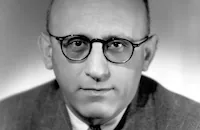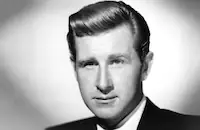The Whistle at Eaton Falls

Cast & Crew
Robert Siodmak
Lloyd Bridges
Dorothy Gish
Carleton Carpenter
Murray Hamilton
James Westerfield
Film Details
Technical Specs

Synopsis
Upon the bankruptcy and auctioning off of the Granite State Shoe company in the small town of Eaton Falls, New Hampshire, the community's economic hopes, as well as its historic whistle, are passed on to the last surviving local company, Doubleday Plastics. Chief machinist and local union leader Brad Adams meets with Doubleday's president Daniel Doubleday to learn that the company's earnings have plummeted due to soaring production costs associated with outdated machinery. When Brad states that the machinists would welcome modern equipment, Dan admits that the only way for the company to afford new machines and remain solvent would be for half of the workers to be laid off. Brad protests that the union would never agree and suggests that Dan use the remaining company profits to keep everyone employed. Dan discloses that he has already reinvested the profits into the company, which still verges on bankruptcy. When Brad continues to object, union-hating plant manager Dwight Hawkins threatens to fire all the workers, but Dan intervenes, declaring that he hopes for an amicable solution. Brad agrees to present the plan to the union, and later consults with trusted co-worker and friend Joe London, who advises him to encourage the union to come up with production cost-cutting measures. When Brad meets with Dan to reiterate that the union will not support layoffs, Dan confides that Doubleday's largest client has refused to renew their contract. Before departing on a trip to regain the account, Dan asks Brad to consider that if the Doubleday company collapses, the entire economy of Eaton Falls will be affected. Later, Dan is killed when his plane crashes, and Hawkins is appointed temporary general manager. The new machinery arrives, but without union approval, the men refuse to operate them. When Hawkins threatens to fire Joe for declining to work, a disgruntled union member, Al Webster, encourages the men to walkout. Brad intervenes, explaining that the men will break their contract and paralyze the union if they walk out. Hawkins reveals that company lawyers are encouraging Dan's widow Helen to sell Doubleday, which would probably mean a company-wide layoff. Meanwhile, lawyer Horace Dunbar and Doubleday treasurer Miss Russell encourage Helen to name Hawkins as the new president, but she appoints Brad. Brad asks to take the offer to the men, and when Joe and others support the move, he accepts. On Brad's first day as head of the company, Hawkins quits, predicting that Brad's pro-unionism and inexperience will destroy Doubleday. Miss Russell informs Brad that a loan payment of $150,000 is due immediately, and is surprised when Brad reveals that he has hired top-notch salesman Glenn Sewell as the new sales manager. Brad then offers foreman Jim Brewster Hawkin's job. Brad convinces the bank to grant Doubleday an extension and, with Glenn, attempts to win a vital contract with the U.S. Navy, but they are underbid. When Brad recognizes that Dan's plan is the only way to save Doubleday, he informs the workers that layoffs are unavoidable. Prompted by agitation from Webster, several workers believe that Brad has "sold out" and the union refuses the layoffs, forcing Brad to shut the company down entirely to retrench. Stress and despair run through Eaton Falls as Brad works feverishly with young designer Eddie Talbot and Jim to devise a new automatic plastic cutter with the potential to double production output. At the local tavern, Webster and others foment discord among the restless men. Later at a union meeting, Brad is accused of attempting to break the union, and Webster pushes for the members to reject the new contract. When Eddie, Jim and Brad succeed in making a clean plastic cutter, Brad demands Glenn secure a contract with a large St. Louis television manufacturing company, National Company, before the approaching union vote. Unknown to Brad, Hawkins is the production manager at National and, upon learning of Glenn's contract pitch, attempts to convince its president, Dick Wagner, to buy Doubleday. Hawkins returns to Eaton Falls to meet with Helen, but she refuses to consider a sell-out. Hawkins then prompts Webster to spread rumors among the workers that Brad is interfering with a buy-out that would immediately reopen Doubleday. When Joe encourages several men at the tavern to vote in support of Brad's contract, he is bashed in the head with a bottle. At the union election later that day, Webster accuses Brad of betraying the union and tempers rise until it is announced that Joe has been hospitalized after his assault. Former union leader Ike gives a speech exhorting the union members to support Brad's contract just as Joe's death is reported. On the day Doubleday reopens, Webster and a few others form a picket line that the union members are hesitant to cross. Brad accuses Miss Russell of conspiring with Hawkins to take over Doubleday and she quits. Brad then telephones Wagner and, insisting that Doubleday is not for sale, pressures him to make a decision on a contract, but Wagner remains unsure. As the union members finally crash through Webster's picket line, Wagner calls back with a large contract offer. Brad informs the workers that everyone can return to work as Doubleday can now offer double shifts.

Director

Robert Siodmak
Cast

Lloyd Bridges

Dorothy Gish

Carleton Carpenter

Murray Hamilton

James Westerfield
Lenore Lonergan
Russell Hardie
Helen Shields
Doro Merande
Diana Douglas

Anne Francis
Anne Seymour

Ernest Borgnine

Arthur O'connell
Parker Fennelly
Donald Mckee
Rev. Robert A. Dunn
Victor Sutherland
Herbert J. Moss
Lawrence Paquin
Andrew W. Donaldson
Seth Arnold
Joe Sullivan
Verne Davemport
John Farrell
James Nolan
William Kent
Bob Maher
Joe Foley
Crew
George Ackerson
Herbert Andrews
Louis Applebaum
Fred Ballmeyer
Mary Brennan
Joseph Brun
Carleton Carpenter
Robert Cushman
Joseph Donovan
Lawrence J. Dugan
Lemist Esler
Carl Forcht
Leonard Heideman
Paul R. Ignatius
Edward Johnstone
William Joyce
Benjamin Kadish
Marie Keeney
J. Sterling Livingston
Borden Mace
Harold Mace
Arthur Maher
Martin Maloney
Thomas Orchard
James Petrie
Walter Pluff
Peter Ratkevich
Louis De Rochemont
Angelo Ross
Fred Ryle
Jack Shaindlin
Virginia Shaler
Robert Siodmak
Shirlee Weingarten
Thomas Whitesell
Lothar Wolff

Film Details
Technical Specs

Quotes
Trivia
Notes
The film's opening title card reads: "The Whistle at Eaton Falls A Drama of Real Life." In the credits of the print viewed, the credit for "Additional Dialogue" was partially illegible, reading only "Lee ___" or "Leo____." Although the exact credit has not been determined by other contemporary or modern sources, it is possible that the name was Leo Rosten, who had previously co-written a Louis de Rochemont film. The Whistle at Eaton Falls marked one of silent-film star Dorothy Gish's rare film appearances. It was her first film in five years and her second-to-last before her permanent retirement in 1963. The film was director Robert Siodmak's last film to be shot in the United States. His remaining films were completed in Europe. The picture was shot on location in Portsmouth, NH, near producer Louis de Rochemont's home town. According to a November 1950 New York Times article, five different locations were utilized to create the film's factory, including one in Exeter, NH, another in Dover, NH and the interior of a plastics factory in Boston, MA. Rev. Robert A. Dunn and John Farrell were Portsmouth locals who had acted in Lost Boundaries, a 1949 DeRochemont production.












